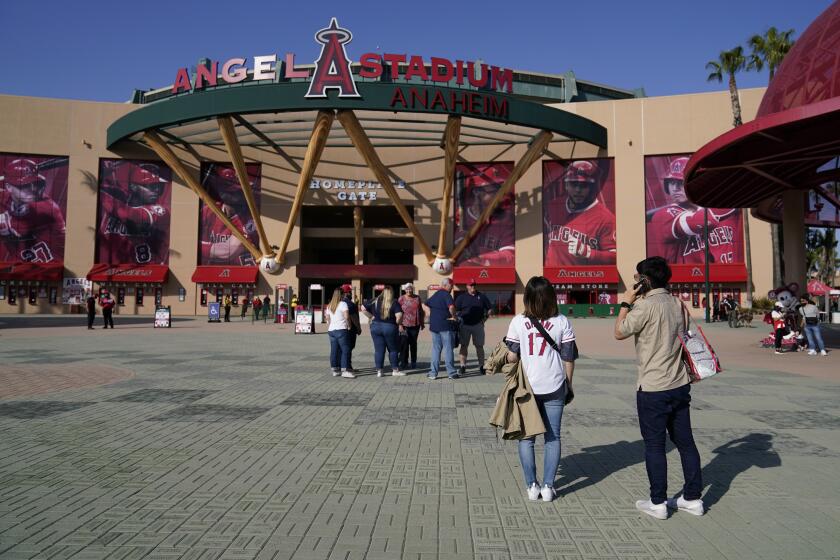The state said Anaheim’s stadium sale broke the law. Who asked for an investigation?

- Share via
A longtime Orange County housing advocacy group warned the city of Anaheim on at least three occasions that its proposed Angel Stadium sale would violate California’s affordable housing law, according to documents reviewed by The Los Angeles Times.
The city disagreed, and the City Council and the city’s planning commission voted to approve the deal. The advocacy group then reported the matter to the state housing agency, which found that Anaheim indeed had violated the law.
That violation could cost Anaheim taxpayers close to $100 million.
Cesar Covarrubias, executive director of the Irvine-based Kennedy Commission, said his group referred the suspected violation of the Surplus Land Act to the state housing agency after the city declined to expand the affordable housing required within the Angel Stadium project.
“That’s something they didn’t want to do,” Covarrubias said. “They just felt they were exempted from the Surplus Land Act.”
The city continues to deny it has violated the law, and it could sue to challenge the state finding. The state could sue to enforce the violation and block the Angel Stadium sale.
Group claims decision was made with ‘a pretense of public participation’ and ‘sham public hearings’ to ratify the decision.
Representatives from the city and state, however, are in talks about a possible settlement in which the sale could go forward, according to people familiar with the discussions who were not authorized to comment publicly about them.
“We don’t have any updates to share at this time,” Anaheim spokesman Mike Lyster said.
In a settlement, the city could face a fine of about $96 million, which could be committed toward affordable housing elsewhere in Anaheim.
If such a settlement comes to fruition, Anaheim could say it negotiated the largest expansion of affordable housing in the city’s history and preserved an Angel Stadium deal projected to add $652 million to city coffers over 30 years, according to an economic impact study commissioned by Angels owner Arte Moreno, whose development company would buy the 150-acre stadium site. The city’s consultants reviewed and backed that study; Anaheim did not commission its own study.
However, of a purchase price originally announced at $325 million, Anaheim could end up with $54 million in cash, with $266 million in credits and fines allocated toward the development of affordable housing and parkland. (The remaining $5 million was subtracted from the price so Anaheim could retain land for a fire station and water well.)
The city has rebuffed calls to scrap the deal and start anew. A citizens group has asked an Orange County Superior Court judge to nullify the deal on grounds Anaheim violated state laws requiring that public business be conducted in public meetings. The city denies the allegations; a hearing is set March 2.
The city also has rejected the suggestion of the state housing agency to resolve the affordable housing violation by putting the land up for bid.
There is concern within City Hall and Angel Stadium that, if this deal is not finalized, Moreno might walk away from any future dealings with the city. In 2014, after he and the city had negotiated a similar deal and the then-mayor torpedoed it, Moreno declined to return to the bargaining table.
And, because the city reinstated the Angels’ lease after the team had opted out of it, he could walk away from this deal and still control development on the site as late as 2038. In that case, Moreno might not build anything there, and the city could forgo hundreds of millions of dollars of tax revenue the development might have generated over the next two decades.
In June, after The Times reported that California’s Department of Housing and Community Development (HCD) had warned Anaheim that the deal might not comply with the Surplus Land Act, the city manager alerted the council to the issue and said the city and HCD had been in discussion for months.
The HCD inquiry built on the concerns reflected in the Kennedy Commission’s letters to the Anaheim City Council, and to the city’s planning commission. Megan Kirkeby, the HCD deputy director of housing policy and development, confirmed the agency had reviewed the Angel Stadium sale at the request of the Kennedy Commission.
The Kennedy Commission, founded in 2001 and named in honor of a housing advocate named Ralph Kennedy, works to increase housing for low-income families in Orange County. The commission challenged Huntington Beach’s compliance with affordable housing laws and won $3.5 million in legal fees from the city, although the city is appealing the amount.

Erualdo Gonzalez, a Cal State Fullerton professor who studies community development and urban planning, called the nonprofit commission a “one of a kind” group that tackles both policy analysis and community organization.
“They have a track record of working on policy issues, not only with specific cities but on a regional level,” Gonzalez said. “They have a pulse on state-level housing issues.”
The Surplus Land Act requires public agencies to first offer whatever property they might sell to affordable housing developers. The Kennedy Commission warned the city that it had not done so, because it had negotiated only with Moreno, and asked the city at least to increase the percentage of housing classified as affordable from 15% to 25%.
The need is urgent, Covarrubias said, since the Disneyland Resort is just down the street from Angel Stadium, and what he called the “entertainment hub” developments planned around the stadium and the nearby Honda Center could exacerbate the housing shortage for low-wage workers in the area.
“That’s precisely what the Surplus Land Act is trying to address: the critical need of city-owned property being used in a way that creates opportunities to address community needs that are not being met by traditional development,” Covarrubias said.
The city has consistently and vehemently denied it violated the law. The property should not be considered surplus, the city contends in part, because the Angels play there now and will continue to do so under the terms of the sale.
HCD said the city could not have had an exclusive negotiating agreement with Moreno’s development company by a Sept. 30, 2019 deadline because the company had not been incorporated by then; the city said it had been negotiating exclusively with Moreno’s representatives for months and “the form of the entity involved … is irrelevant because the controlling parties are the same.”
Anaheim Mayor Harry Sidhu should be able to identify who doesn’t want the city’s Angel Stadium land deal with Arte Moreno to succeed, but he’s not talking.
And, given the Angels’ ability to restrict housing on the property under their current lease, the city argues that HCD is pursuing the violation to what it called an “absurd” end.
“The only result of successful enforcement would be the elimination of an existing agreement to provide affordable housing,” City Atty. Robert Fabela wrote to HCD earlier this month.
At that, Covarrubias bristled.
“When they say HCD is impeding the city from creating affordable housing, that’s not true,” Covarrubias said. “HCD is saying, ‘Follow the law.’ ”
More to Read
Go beyond the scoreboard
Get the latest on L.A.'s teams in the daily Sports Report newsletter.
You may occasionally receive promotional content from the Los Angeles Times.









